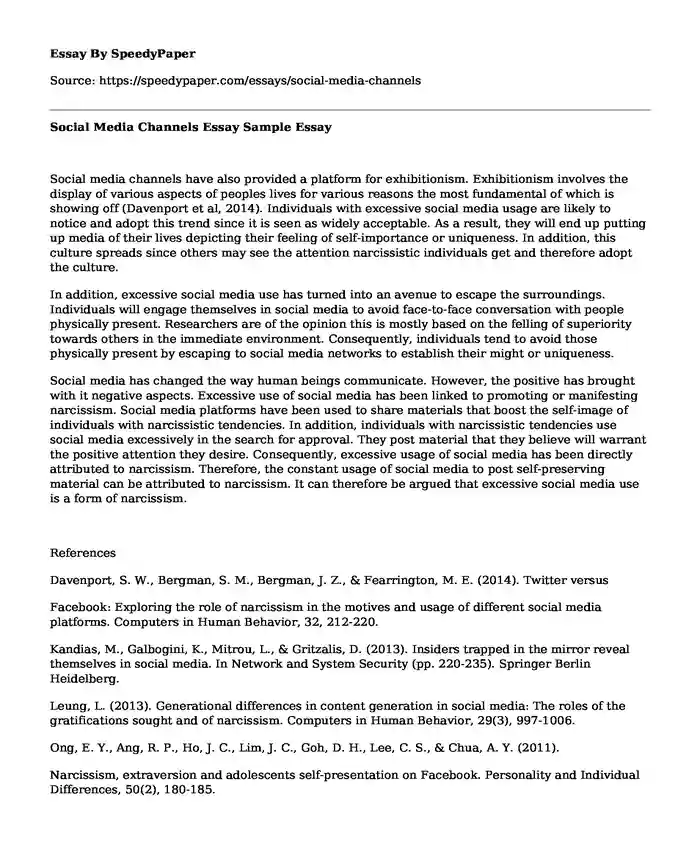
| Type of paper: | Essay |
| Categories: | Communication Social media |
| Pages: | 2 |
| Wordcount: | 463 words |
Social media channels have also provided a platform for exhibitionism. Exhibitionism involves the display of various aspects of peoples lives for various reasons the most fundamental of which is showing off (Davenport et al, 2014). Individuals with excessive social media usage are likely to notice and adopt this trend since it is seen as widely acceptable. As a result, they will end up putting up media of their lives depicting their feeling of self-importance or uniqueness. In addition, this culture spreads since others may see the attention narcissistic individuals get and therefore adopt the culture.
In addition, excessive social media use has turned into an avenue to escape the surroundings. Individuals will engage themselves in social media to avoid face-to-face conversation with people physically present. Researchers are of the opinion this is mostly based on the felling of superiority towards others in the immediate environment. Consequently, individuals tend to avoid those physically present by escaping to social media networks to establish their might or uniqueness.
Social media has changed the way human beings communicate. However, the positive has brought with it negative aspects. Excessive use of social media has been linked to promoting or manifesting narcissism. Social media platforms have been used to share materials that boost the self-image of individuals with narcissistic tendencies. In addition, individuals with narcissistic tendencies use social media excessively in the search for approval. They post material that they believe will warrant the positive attention they desire. Consequently, excessive usage of social media has been directly attributed to narcissism. Therefore, the constant usage of social media to post self-preserving material can be attributed to narcissism. It can therefore be argued that excessive social media use is a form of narcissism.
References
Davenport, S. W., Bergman, S. M., Bergman, J. Z., & Fearrington, M. E. (2014). Twitter versus
Facebook: Exploring the role of narcissism in the motives and usage of different social media platforms. Computers in Human Behavior, 32, 212-220.
Kandias, M., Galbogini, K., Mitrou, L., & Gritzalis, D. (2013). Insiders trapped in the mirror reveal themselves in social media. In Network and System Security (pp. 220-235). Springer Berlin Heidelberg.
Leung, L. (2013). Generational differences in content generation in social media: The roles of the gratifications sought and of narcissism. Computers in Human Behavior, 29(3), 997-1006.
Ong, E. Y., Ang, R. P., Ho, J. C., Lim, J. C., Goh, D. H., Lee, C. S., & Chua, A. Y. (2011).
Narcissism, extraversion and adolescents self-presentation on Facebook. Personality and Individual Differences, 50(2), 180-185.
Park, N., Kee, K. F., & Valenzuela, S. (2009). Being immersed in social networking environment: Facebook groups, uses and gratifications, and social outcomes. CyberPsychology & Behavior, 12(6), 729-733.
Ryan, T., & Xenos, S. (2011). Who uses Facebook? An investigation into the relationship between the Big Five, shyness, narcissism, loneliness, and Facebook usage. Computers in Human Behavior, 27(5), 1658-1664.
Cite this page
Social Media Channels Essay Sample. (2019, May 22). Retrieved from https://speedypaper.com/essays/social-media-channels
Request Removal
If you are the original author of this essay and no longer wish to have it published on the SpeedyPaper website, please click below to request its removal:
- Presidential Election 2016, Free Essay
- Free Essay on BHP Billiton and Green Marketing
- Free Essay about Causes of Anxiety in Adolescent
- Essay Example on Lufthansa and Emirates Airline Competition
- Essay Example on Prisoners' Rights
- Paper Due Date
- Essay Sample: Dr. Faustus and Relevance to the Modern Reader
Popular categories




